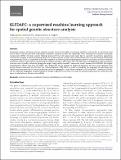KLFDAPC : a supervised machine learning approach for spatial genetic structure analysis
Abstract
Geographic patterns of human genetic variation provide important insights into human evolution and disease. A commonly used tool to detect and describe them is principal component analysis (PCA) or the supervised linear discriminant analysis of principal components (DAPC). However, genetic features produced from both approaches could fail to correctly characterize population structure for complex scenarios involving admixture. In this study, we introduce Kernel Local Fisher Discriminant Analysis of Principal Components (KLFDAPC), a supervised non-linear approach for inferring individual geographic genetic structure that could rectify the limitations of these approaches by preserving the multimodal space of samples. We tested the power of KLFDAPC to infer population structure and to predict individual geographic origin using neural networks. Simulation results showed that KLFDAPC has higher discriminatory power than PCA and DAPC. The application of our method to empirical European and East Asian genome-wide genetic datasets indicated that the first two reduced features of KLFDAPC correctly recapitulated the geography of individuals and significantly improved the accuracy of predicting individual geographic origin when compared to PCA and DAPC. Therefore, KLFDAPC can be useful for geographic ancestry inference, design of genome scans and correction for spatial stratification in GWAS that link genes to adaptation or disease susceptibility.
Citation
Qin , X , Chiang , C W K & Gaggiotti , O E 2022 , ' KLFDAPC : a supervised machine learning approach for spatial genetic structure analysis ' , Briefings in Bioinformatics , vol. 23 , no. 4 , bbac202 . https://doi.org/10.1093/bib/bbac202
Publication
Briefings in Bioinformatics
Status
Peer reviewed
ISSN
1467-5463Type
Journal article
Description
Funding: CSC-University of St Andrews Joint Scholarship (to X.Q.); International Postdoctoral Exchange Fellowship Program (Talent-Introduction Program) from China Postdoc Council (to X.Q.); National Institute of General Medical Sciences (NIGMS) of the National Institute of Health (grant R35GM142783 to C.W.K.C.). Part of the computation for this work is supported by USC’s Center for Advanced Research Computing (https://carc.usc.edu).Collections
Items in the St Andrews Research Repository are protected by copyright, with all rights reserved, unless otherwise indicated.

